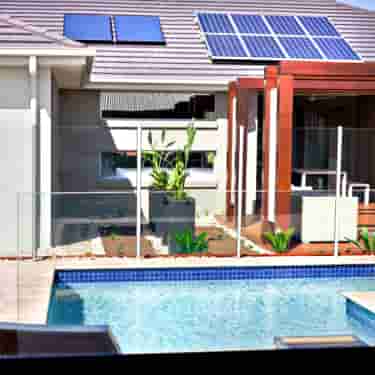With energy prices soaring across the globe, running my pool is quickly becoming more expensive every year. I want to explore how solar panel pool heaters work and decide if they are a viable pool heating option.
Solar panel pool heaters can effectively heat a pool, however they only heat your pool water when the sun shines. In winter, they are not an effective heating solution if you live in a colder climate. Solar panels are often used alongside traditional pool heaters, such as electric or gas heaters.
In this article, I want to investigate:
- How do solar panel pool heaters work?
- What are the pros and cons of solar panel pool heaters?
- Are solar panels a free way to heat my pool?
- What size solar panels do I need?
- How much sunlight do I need for them to heat my pool?

How Do Solar Panel Pool Heaters Work?
Solar panel pool heaters work by using the sun’s energy to heat your pool water.
Although the exact operation of different solar panel pool heaters might vary, the fundamental principles of how they work and heat your pool water are the same.
Solar Panel Pool Heater Operation:
- Cold water is pumped from your pool through the solar panels.
- The solar panels should be hot from sitting in the sun all day. As the cold pool water passes over the hot solar panels, it is heated as it is in contact with the hot surface of the panels.
- This heated water is then pumped out of the solar panels and back into your pool.
Here is an excellent animation showing the operation and flow of water.
The blue pipe represents the cold water being pumped from your pool into the solar panels (which should be warm) and the red pipe represents the heated water being returned to your pool.
What are the Pros and Cons of Solar Panel Pool Heaters?
Like all pool heating systems, solar panel heaters have advantages and disadvantages.
The Pros:
1 – Low Running Costs
Once you overcome the initial setup costs, the day to day running of a solar panel pool heater is cheaper than other pool heating systems.
The heating itself is provided by the sun, which is free energy, therefore the cost of heating is minimal.
A pump must still be operated to push water through the solar panels. Many solar panel systems will use your existing pool filter pump to do this job, therefore there are minimal additional heating and pumping costs.
2 – Low Carbon Footprint
Solar energy is a natural and renewable source of energy, so you can be sure you have picked the best pool heating process for the environment.
Unlike gas heaters, there are no emissions from solar panel pool heating and the sun’s energy can be topped up infinitely, unlike the limited supply of gas, which is a fossil fuel.
The Cons:
1 – Solar Panels Are Not Effective All Year Around
Solar panels are not a year round solution.
In the winter, solar panels are not as effective for the following reasons:
- The sun is lower in the sky – this means the sunlight will be less intense.
- The air temperature is lower – a colder ambient air temperature will try to cool the solar panels faster than they can heat up.
- There is less sunlight – days are shorter in the winter resulting in less sunlight and less time for the solar panels to heat.
2 – Large Amounts Of Space Required For Installation
The larger the surface area of your solar panels, the more sunlight you can capture and convert to heat.
Typically, the surface area of your solar panels should be the same surface area as your pool. This is a very big installation footprint!
In other words, you need the same amount of space as your pool again in order to fit enough solar panels to heat your pool.
For example, if you have a pool that is 4meters by 3 meters, you will need a space that is 4meters by 3meters to locate your solar panels.
3 – Heat Output Dependent On The Weather.
Solar panels only work when the sun shines, so if you do not have any sun, you won’t have any hot pool water.
If you run your solar panel system when the sun is not shining, you could end up dropping the temperature of your pool.
When you live in a wetter or colder climate, this is not ideal.
4 – Cold Morning Swims (Depending On Where You Live)
70% of heat loss with solar panels takes place at night, so if you are an early morning swimmer, your pool will be cold as most of the heat will be lost overnight. You will need to wait for the sun to rise to reheat your pool.
Many people supplement their solar panel pool heaters with electric or gas heaters to avoid the above disadvantages of solar panel heating.
I have found this the most effective solution, as my electric heater will help get my pool water up to a comfortable temperature, and then the solar panel system can maintain that temperature for the day (assuming it is a sunny day!)
Steinbach Speed Solar Sun 49120 Solar Pool Heater Low-Density Polyethylene 0.7 x 3 m for Pools with Capacity of up to 12 Cubic Metres/Hose Connector Diameter 32/38 mm
- Simple design
- Easy to connect
- A must for cold water pools
Are Solar Panels A Free Way To Heat My Pool?
Although the heat captured by the sun is free, solar panels are not free to run as they require a pump to move water through the system.
Typically, your existing pool filter pump is connected to your solar panels to pump water through them.
This is an excellent way to minimise cost, as your pool filter pump will need to be running anyway, so you are in effect using your filter pump to do two things:
- Filter your pool as normal.
- Circulate water through your solar panels to heat your pool.
It is important to insulate your pool as best as you can to maintain the heat by either using a pool thermal blanket or a solar cover.
Personally, I use a solar cover and it is excellent for maintaining the pool temperature, as well as heating the surface of the pool water when it is sunny.

What Sized Solar Panels Do I need?
The size of solar panels you need to heat your pool will depend on the size of the pool and if the pool is well insulated with a solar pool cover or thermal blanket.
As a general rule of thumb, the surface area of your solar panels should be at least the same size as the surface area of your pool, assuming you are using a solar pool cover or thermal blanket to keep heat in.
For example, the surface area of a 4m x 3m pool is 12m2. This is calculated by multiplying the length of your pool by the width of your pool.
If you have a circular pool, you can calculate the surface area of your pool using this formula:
A = π x r²
Where:
- A = this is the surface area that you are looking for.
- π = 3.14
- r = the radius of your pool.
To find the radius, half the diameter of your pool. For example, if your pool is 6m in diameter, the radius will be 3m.
Once you know the surface area of your pool, you need to find solar panels that will cover the same area.
When installing the solar panels, ensure you fit them in a place that will be exposed to sunlight. For example, a south-facing surface such as a rooftop or flat ground.
How Much Sunlight Do I Need To Heat My Pool?
I am currently living in the South East of England, where we get a lot of sunshine in the summer.
However, England is mostly known for its terrible summers, so how much sunlight do I really need to heat my pool?
It is really difficult to find an answer to this, and I have found that looking at the specifications of the solar panel heating product is the best way to gauge if your solar panel will get be good enough to heat your pool.
At the end of the day, you need warm and direct sunlight for any solar pool heater to work. The more sunlight you get, the hotter you can make your pool and the longer you can keep it warm.
The following is a solar heating mat that is a perfect solar heating option for my own pool. On a hot summer’s day, this material will be hot to touch.
Using my existing filter pump to move water through the solar heating mat, the manufacturer estimates this mat will increase the pool water temperature by 3-5 degrees.


